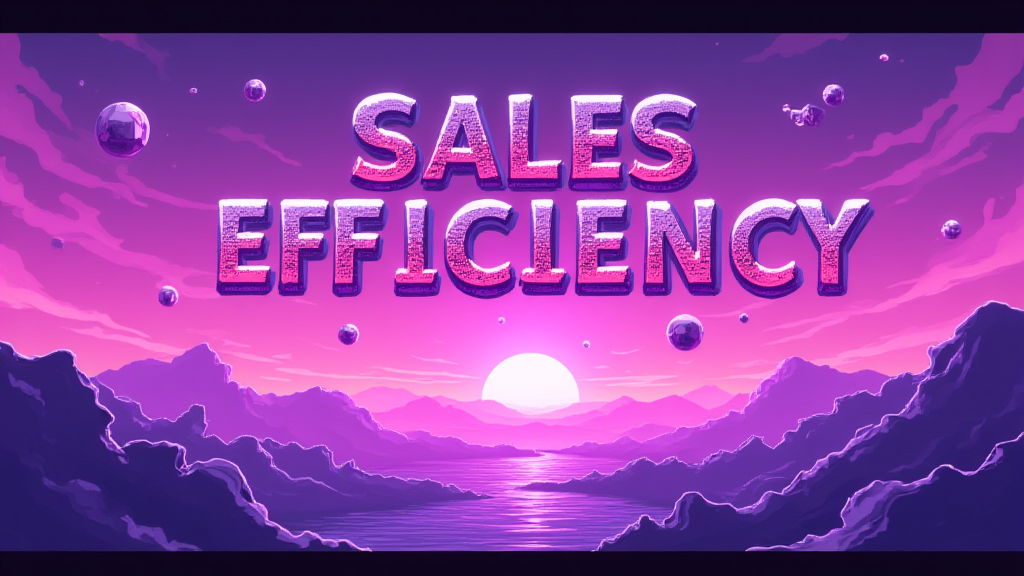Sales Efficiency: Maximizing Revenue Generation

Published on: October 01, 2024
In the fast-paced world of business, Sales Efficiency is a crucial metric that measures how effectively a company's sales efforts translate into revenue. It's the golden ratio that helps organizations understand the return on their sales and marketing investments, guiding strategic decisions and resource allocation.
Understanding Sales Efficiency 📊
Sales Efficiency is typically calculated using the following formula:
\[ \text{Sales Efficiency} = \frac{\text{New Annual Recurring Revenue (ARR)}}{\text{Sales and Marketing Expenses}} \]
This metric provides insights into how much revenue is generated for every dollar spent on sales and marketing activities. A higher ratio indicates better efficiency, while a lower ratio suggests room for improvement.
Why Sales Efficiency Matters 🎯
- Resource Optimization: Helps allocate budget and personnel effectively
- Growth Forecasting: Aids in predicting future revenue based on planned investments
- Performance Benchmarking: Allows comparison with industry standards and competitors
- Investor Attractiveness: High sales efficiency can make a company more appealing to investors
Factors Influencing Sales Efficiency
Several elements can impact a company's sales efficiency:
- Sales Process Optimization
- Lead Quality
- Sales Team Training and Skills
- Technology and Tools
- Market Conditions
- Product-Market Fit
Common Sales Efficiency Benchmarks 📈
| Ratio | Interpretation |
|---|---|
| < 1:1 | Poor efficiency, immediate improvement needed |
| 1:1 | Break-even point, room for improvement |
| 3:1 | Good efficiency, typical for established SaaS companies |
| > 3:1 | Excellent efficiency, highly scalable business model |
Strategies to Improve Sales Efficiency 🚀
- Implement Sales Enablement: Provide your team with the right tools, content, and information to sell more effectively.
- Optimize Your Sales Funnel: Identify and eliminate bottlenecks in your sales process.
- Leverage Technology: Utilize CRM systems, sales automation tools, and analytics platforms to streamline operations.
- Focus on High-Quality Leads: Improve lead scoring and qualification processes to ensure sales efforts are directed towards the most promising prospects.
- Continuous Training: Regularly upskill your sales team to keep them at the cutting edge of sales techniques and product knowledge.
Sales Efficiency vs. Sales Effectiveness
While often used interchangeably, these terms have distinct meanings:
- Sales Efficiency: Focuses on the resources used to achieve sales results (time, money, effort)
- Sales Effectiveness: Emphasizes the quality of the sales process and its outcomes
Both are crucial for overall sales performance, but efficiency specifically looks at the cost-effectiveness of sales operations.
Challenges in Measuring Sales Efficiency
While sales efficiency is a powerful metric, it's not without its challenges:
- Attribution Issues: Difficulty in accurately attributing revenue to specific sales and marketing efforts
- Time Lag: The delay between investment and revenue realization can skew short-term measurements
- Varying Business Models: Different industries and business types may require adjusted formulas or interpretations
To overcome these challenges, it's essential to use sales efficiency in conjunction with other metrics and to consider the specific context of your business when interpreting results.
Implementing Sales Efficiency in Your Organization
To effectively implement and improve sales efficiency in your organization, consider asking yourself these questions:
- How does our current sales efficiency compare to industry benchmarks?
- What tools or technologies could we implement to streamline our sales process?
- Are we effectively targeting the right leads and prospects?
- How can we better align our sales and marketing efforts to improve overall efficiency?
- What training or resources does our sales team need to become more efficient?
By regularly assessing and optimizing your sales efficiency, you can drive sustainable growth, maximize your return on investment, and stay competitive in today's dynamic business landscape.

















